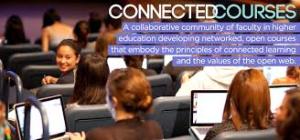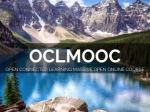Various learners often walk away from learning opportunities with tremendously different results and rewards. And that’s certainly going to be the case in two new connectivist MOOCs (massive open online courses)—the Connected Courses MOOC (#ccourses) offered by a “collaborative network of faculty in higher education developing online, open courses that embody the principles of connected learning and the values of the open web,” and the Open Connected Learning MOOC (#oclmooc) open to trainer-teacher-learners worldwide. That each-learner-his/her-own-reward outcome is one of the many strengths this sort of innovative, high-engagement learning opportunity provides: we grow with colleagues within dynamic global communities of learning; we set and achieve our own learning goals; and we emerge from the experience as better, more empathetic facilitators of learning.
 This is a world where the concept of “failure” is left behind and the idea that learning is documented in positive ways (e.g., badging or points for achievements) changes the way we approach our work, author-educator Cathy Davidson reminded us during the live online panel discussion that formally opened #ccourses earlier this afternoon. Panel moderator Michael Wesch was (virtually) right there beside her with his mention of providing “not-yet” grades so his learners know that they haven’t failed—they “just haven’t gotten there yet!”
This is a world where the concept of “failure” is left behind and the idea that learning is documented in positive ways (e.g., badging or points for achievements) changes the way we approach our work, author-educator Cathy Davidson reminded us during the live online panel discussion that formally opened #ccourses earlier this afternoon. Panel moderator Michael Wesch was (virtually) right there beside her with his mention of providing “not-yet” grades so his learners know that they haven’t failed—they “just haven’t gotten there yet!”
It’s a lesson that resonates for me, for I’ve spend considerable time with on-the-job adult learners who enter their learning spaces fearing that their presence in “training” is the precursor to losing their jobs (because they lack essential skills). Reminding them that their employers are paying my colleagues and me to help them gain skills needed so they can continue working is the essential first step in lowering their stress levels and facilitating the learning successes that benefit them, their employers, and the customers and clients they ultimately will continue serving.
Listening to Davidson, Wesch, and their co-panelist Randy Bass address a series of thought-provoking questions that would resonate with any inquisitive trainer-teacher-learner (e.g., what is to be taught, how should something be learned, and why should a particular subject or skill be learned?)—and simultaneously interacting with other learners via Twitter—provided what Davidson cited as one of the many benefits of connected learning: all of us had plenty of time during that stimulating online session to reflect on the “why” behind the learning we facilitate, and we left the session encouraged to engage in additional reflection (via this sort of blog article as well as through online interactions that help us, sooner than later, to use what we are learning).
It was also, for anyone who took time to dive into some of the course readings and videos before attending the live online session, an opportunity to experience the flipped classroom model of learning and also viscerally see how expansive (and potentially overwhelming) learning in a connected-learning environment can be.
Watching Wesch’s 33-minute “Why We Need a ‘Why?’” video lecture just before the live session began this afternoon, for example, nicely teed up the topic for me and prepared me to better use the live (virtual) classroom time to more deeply engage with others during the session. His taped video lecture, in turn, led me to another of the posted class materials—the fabulous “This is Water” video excerpt from writer-educator David Foster Wallace’s commencement speech delivered at Kenyon College in 2005; it includes the poignant and powerful reminder that “the freedom of real education, of learning how to be well-adjusted” is that we “get to consciously decide what has real meaning and what doesn’t.” Davidson’s live-session mention of how her Duke University courses include opportunities for learners to go well beyond the traditional setting of closed/private-classroom discussions to include projects open to online interactions with those not formally enrolled in her courses carries us over to an article she wrote as part of a course project with her learners: “How a Class Becomes a Community: Theory, Method, Examples,” from one group of learners’ course project (a full-length online book, Field Notes for 21st Century Literacies). It makes us wonder why more of us involved in on-the-job adult learning don’t encourage learners to produce learning objects (e.g., simple work samples or more ambitious on-the-job manuals from which others can learn) as part of their learning process. This could be a digital-era variation on an each-one-teach-one approach that brings tremendous rewards for everyone involved.
Bass’s live-session observations round out the picture: they entice us into continuing our connected learning experience by reading his article “Disrupting Ourselves: The Problem of Learning in Higher Education,” from the March/April 2012 issue of EDUCAUSE Review, and learning more about the evolving nature of our basic assumptions about what a course is and how team-based learning (where “…the instructor is no longer at the center. Instead, the course and student learning are at the center, surrounded by all these other players [teaching center staff, technology staff, librarians, and others] at the table”) is creating levels of engagement that might provide additional rewards for everyone involved in the training-teaching-learning process.
It’s enough to make our heads spin. But we’re too deeply immersed and appreciative to overlook some of the key repercussions here. These connectivist MOOCs draw us into learning that meets our current learning needs. They help us understand the value of online communities of learning by making us members of engaged online communities of learning. They offer us as many learning pathways as we care to explore, and they put us virtually face-to-face with learning facilitators, mentors, colleagues, and other learners we would otherwise not have the opportunity to meet.
 As those of us who are learners in #ccourses and trainer-teacher-learners in #oclmooc begin (or continue) to interact not only within the formal learning environments of weekly interactive sessions but also through synchronous and asynchronous interactions over a variety of platforms including blogs and Twitter and Google+ communities (as well as between the two MOOCs and other communities of learning), the real connections themselves and the learning itself will continue providing the compelling “why?” that brings us all together in ways that will better serve learners worldwide.
As those of us who are learners in #ccourses and trainer-teacher-learners in #oclmooc begin (or continue) to interact not only within the formal learning environments of weekly interactive sessions but also through synchronous and asynchronous interactions over a variety of platforms including blogs and Twitter and Google+ communities (as well as between the two MOOCs and other communities of learning), the real connections themselves and the learning itself will continue providing the compelling “why?” that brings us all together in ways that will better serve learners worldwide.
N.B.: This is the second in a series of posts documenting learning through #ccourses and #oclmooc.

Thank you for your excellent recap of yesterday’s Connected Courses session. I especially appreciate that you included so many of the resources they mentioned, as I was unable to take notes as they spoke and doubt I’ll have time to revisit the session in full.
Thanks, too, for mentioning #oclmooc. As someone involved in teacher education, I’d be interested in learning more. I’ll scan your posts about it. In the event that those don’t mention how to become involved, may I ask you to post a link?
Thanks.
Karen: Thanks a million for the kind words and encouragement. Happy to provide links to #oclmooc since I’m lucky enough to be working with the team that is designing and facilitating it: the main page is at https://oclmooc.wordpress.com/, and the registration form for participants is at https://docs.google.com/forms/d/1uvX1w9w9Nbxa0zIe9QwMh3GwaBdMz4uREhvgygYE0jo/viewform. I’m looking forward to documenting the connections that come from being involved in two wonderful connectivist MOOCs at the same time, and am glad to see that the Connected Courses MOOC (#ccourses) is already doing what it’s meant to do–connecting learners like you and me.
Paul, you are such a great writer and an inspirational member of our team. Thanks for the call out for #oclmooc, the closer we get to our official start the more excited I am about our plans.